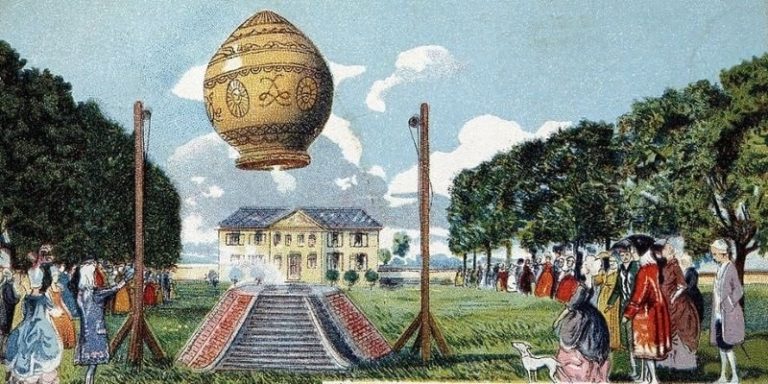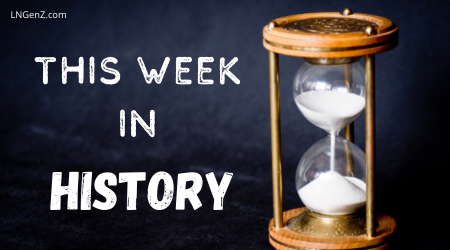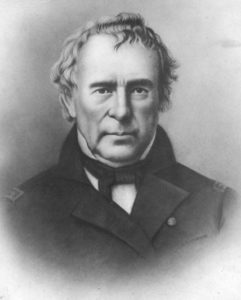This Week in History: November 20 – 26
The first hot-air balloon flight with passengers happened in France.
By: Kelli Ballard | November 20, 2022 | 1073 Words

(Photo by Universal History Archive/Getty Images)
“The historian will tell you what happened. The novelist will tell you what it felt like.” ~ E.L. Doctorow
November 21, 1783: The First Hot-Air Balloon Flight
Today, it might not seem like a big deal to fly in a hot-air balloon or on an airplane, but for centuries people dreamed of finding a way to make flying a reality. Several attempts and inventions were made throughout history such as Leonardo da Vinci’s designs back in the 15th century that helped envision today’s helicopters, and the Greek mythological story of Daedalus, who made wings of wax.
But, on this day, the human race found the ability to reach the skies and realized the dreams of their ancestors. Jean-Francois Pilatre de Rozier and Francois Laurent le Vieux d’Arlandes (also known as Monsieur le Marquis d’Arlandes) left Chateau de la Muette, which was the home of Louis XVI and Marie-Antoinette in the outskirts of Paris. Before this momentous flight, de Rozier had practiced learning how to control the balloon while it was still tethered to the ground. Now it was time to remove the tethers and test the contraption.
The men were able to climb to an altitude of about 3,000 feet and coasted on the winds for about 25 minutes. They could have had a longer flight, but the embers from the fire that fills the balloon with its hot air was starting to burn the balloon. Benjamin Franklin, a well-known inventor himself, was a spectator.
There are some that say this wasn’t the first invention of machines that actually flew. In 1781, German architect Carl Friedrich Meerwein was able to get his ornithopter (a glider aircraft that had flapping wings) off the ground, but it never became a viable way of reaching the skies.
Other Notable History Mentions
November 20, 1789: New Jersey ratified the Bill of Rights, becoming the first state to do so.
November 20, 1910: Francisco Madero started a social revolution in Mexico. He was known as the “Apostle of Democracy” and was elected president in 1911. He was removed from office in 1913 with a military revolt and then assassinated.
November 20, 1917: During World War I, tanks were used for the first time in battle.
November 20, 1947: Princess Elizabeth of England married Philip Mountbatten. In 1952, she became Queen Elizabeth II.
November 20, 1962: President John F. Kennedy lifted the naval blockade of Cuba, ending the Cuban Missile Crisis.
November 20, 1992: A fire causing extensive damage broke out inside Windsor Castle, where Queen Elizabeth was living.
November 21, 1992: The Anglican Church of Australia voted to allow women to become priests.
November 22, 1947: Vasco Da Gama, a Portuguese navigator, and his fleet of four ships were searching for a sea route to India and became the first to sail around the Cape of Good Hope.
November 22, 1718: The infamous pirate Blackbeard (Edward Teach) was killed off the coast of North Carolina.
November 22, 1935: For the first time, trans-pacific airmail was available. The first flight took place on a Pan American flying boat that left from San Francisco, California and, after 59 hours, reached the Philippines.
November 22, 1943: The Cairo Conference took place with President Franklin D. Roosevelt, Chinese Nationalist leader Chiang Kai-shek, and British Prime Minister Winston Churchill. They met to discuss the war against Japan.
November 22, 1963: In Dallas, Texas, President John F. Kennedy was traveling by motorcade when he was assassinated.
November 22, 1990: Prime Minister Margaret Thatcher announced she would resign. She had held the office for 11 years, the longest term of any PM in the 20th century.
November 23, 1859: On the Origin of Species by Means of Natural Selection by Charles Darwin was first published.
November 24, 1874: Joseph Glidden invented and patented barbed wire.
November 24, 1992: After almost 100 years, the US military left the Philippines.
November 25, 1783: The last of the British troops left New York City at the end of the Revolutionary War.
 November 25, 1974: Britain outlawed the IRA after a bombing in Birmingham.
November 25, 1974: Britain outlawed the IRA after a bombing in Birmingham.
November 25, 1992: Czechoslovakia’s parliament voted to divide the country into separate Slovakia and Czech republics.
November 26, 1703: A “Great Storm” in England flooded the Thames and Severn Rivers. It lasted for two days.
November 26, 1789: President George Washington proclaimed the nation’s first holiday: Thanksgiving Day.
November 26, 1832: Passengers rode in the first horse-drawn streetcar along Fourth Avenue in New York City.
November 26, 1922: Howard Carter and Lord Carnarvon went inside King Tutankhamen’s tomb in Egypt for the first time.
Famous Birthdays
Selma Lagerlof (November 20, 1858) was born in Varmland Province. In 1909, she became the first woman to receive the Nobel Prize for literature.
Edwin Hubble (November 20, 1889) was born in Marshfield, Missouri. He was an astronomer who started the concept of an expanding universe. The Hubble Space Telescope was named after him.
Robert F. Kennedy (November 20, 1925) was born in Brookline, Massachusetts. He was President John F. Kennedy’s younger brother and was a senator in New York. He was campaigning for the presidential election when he was assassinated.

Zachary Taylor (Photo by PhotoQuest/Getty Images)
Voltaire (November 21, 1694) was born in Paris as Francois-Marie Arouet. A French author who advocated human rights, he is known for such works as Philosophical Letters (1734) and Essay on Morals.
Wiley Post (November 22, 1898) was born in Grand Plain, Texas. A self-taught pilot, he became famous in the 1930s when he co-authored the book Around the World in Eight Days.
Franklin Pierce (November 23, 1804) was born in Hillsboro, New Hampshire. He was the 14th president of the US.
William H. Bonney (November 23, 1859) was a Wild West outlaw known as Billy the Kid.
Boris Karloff (November 23, 1887) was born in London as William Henry Pratt. An actor, he is most known for his roles in Frankenstein and The Bride of Frankenstein.
Zachary Taylor (November 24, 1784) was born in Orange County, Virginia. He was the 12th president of the US.
Andrew Carnegie (November 25, 1835) was born in Dunfermline, Scotland. After moving to America, he made a fortune in steel and gifted the nation with more than 2,500 libraries as well as the famous Carnegie Hall. He wrote: “The man who dies rich dies disgraced.”
Pope John XXIII (November 25, 1881) was born in Sotto il Monte, Italy as Angelo Roncalli. He was the 261th pope of the Roman Catholic Church.
John Harvard (November 26, 1607) was born in London. He founded Harvard College.
Mary Edwards Walker (November 26, 1832) was born in Oswego, New York. During the Civil War, she was the first female surgeon in the army. She was the first and only woman to receive the Medal of Honor in 1865.
















